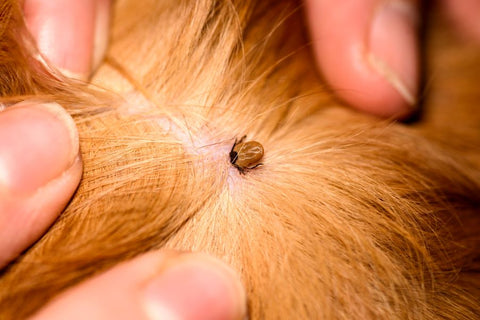

Key Highlights
- Canine and feline parasites are common and can pose a risk to both pets and humans.
- Fleas, ticks, heartworms, roundworms, hookworms, whipworms, tapeworms, mites, giardia, and coccidia are the 10 common parasites every pet parent should be aware of.
- These parasites can cause a variety of symptoms and health issues in dogs and cats, including weight loss, diarrhea, anemia, and skin irritations.
- Prevention and regular vet check-ups are crucial in protecting your pet from parasites.
- Knowing the signs of parasitic infections and when to seek veterinary care is essential for your pet's well-being.
- Frequently asked questions about treating and preventing parasites in pets will be addressed in this blog.
Introduction
Parasites are a common concern for pet parents, especially when it comes to their dogs and cats. These tiny organisms can cause a range of health problems in pets and even pose a risk to humans. It's important for every pet parent to be aware of the common parasites that can affect their furry friends and take necessary precautions to protect them.
In this blog, we will discuss 10 common canine parasites that every pet parent should know about. These parasites include fleas, ticks, heartworms, roundworms, hookworms, whipworms, tapeworms, mites, giardia, and coccidia. We will explore their characteristics, life cycles, symptoms, and treatment options. By understanding these parasites, their risks, and how to prevent and treat them, you can ensure the health and well-being of your beloved pets.
Remember, regular veterinary check-ups, good hygiene practices, and preventive measures are key in keeping your cats and dogs safe from these parasites. Let's dive into the world of feline and canine parasites and equip ourselves with the knowledge to protect our furry friends.
10 Parasites Every Dog & Cat Owner Must Be Aware Of
Dogs are susceptible to a variety of internal parasites that can affect their gastrointestinal health. These parasites are known as gastrointestinal parasites or internal worms. There are 10 common parasites that every dog owner should be aware of to ensure the well-being of their furry companions. These parasites include fleas, ticks, heartworms, roundworms, hookworms, whipworms, tapeworms, mites, giardia, and coccidia. Understanding the risks, symptoms, and treatment options for these parasites is crucial for maintaining your pet's health.
1. Fleas: The Pesky Jumpers
Fleas are tiny, wingless insects that are infamous for their ability to jump long distances. They are a common parasite that can infest dogs or cats and cause discomfort and irritation. Here are some key points about fleas:
- Fleas require an intermediate host, such as a dog, to complete their life cycle.
- The life cycle of a flea includes egg, larva, pupa, and adult stages.
- Fleas feed on the blood of their host and can cause itching, scratching, and allergic reactions.
- Flea infestations can lead to skin infections and other health issues in dogs and cats.
- Regular grooming, flea prevention treatments, and keeping your pet's environment clean can help prevent flea infestations.
It is important to note that flea infestations can also spread to humans and other pets in the household. Therefore, prompt treatment and preventive measures are necessary to protect both your dog and your family from these pesky jumpers.
2. Ticks: The Blood Suckers
Ticks are arachnids that feed on the blood of animals, including dogs or cats. They are commonly found in grassy and wooded areas. Here are some key points about ticks:
- Ticks can transmit diseases to cats and dogs, including Lyme disease, ehrlichiosis, and anaplasmosis.
- Lyme disease is a tick-borne illness that can cause joint pain, fever, and fatigue in animals.
- Tick-borne diseases can also affect humans, making tick prevention crucial for both pets and their owners.
- Regular tick checks, the use of tick preventives, and avoiding tick-infested areas can help protect your furry friends from these bloodsuckers.
- If you find a tick on your pet, it is important to carefully remove it using tweezers and clean the bite area to prevent infection.
Ticks are most active during the warmer months, but they can be present year-round in certain regions. Stay vigilant and take preventive measures to keep these bloodsuckers away from your furriend.
3. Heartworms: The Silent Killers
Heartworms are a serious and potentially life-threatening parasitic infection that can affect cats and dogs. They are transmitted through the bite of an infected mosquito. Here are some key points about heartworms:
|
Cause |
Heartworms are caused by the parasitic worm Dirofilaria immitis. |
|
Transmission |
Mosquitoes transmit heartworm larvae to dogs or cats during a bite. |
|
Life Cycle |
Adult heartworms live in the heart and major blood vessels of infected dogs or cats. |
|
Symptoms |
Infected pets may show symptoms such as coughing, fatigue, and weight loss. |
|
Diagnosis |
A blood test can confirm the presence of heartworms in cats or dogs. |
|
Treatment |
Treatment involves the use of medication to kill adult heartworms. |
|
Prevention |
Monthly heartworm preventives are crucial in preventing heartworm infection. |
Heartworms can cause severe damage to a animal's heart, lungs, and overall health. Preventive measures, such as regular administration of heartworm preventives and minimizing mosquito exposure, are essential to protect your dog or cat from these silent killers.
4. Roundworms: The Common Intestinal Invaders
Roundworms, specifically Toxocara canis and Toxascaris leonine, are the most common intestinal parasites in dogs and cats. They can affect pets of all ages, but young puppies and kittens are particularly vulnerable. Here are some key points about roundworms:
- Roundworms live in the intestinal tract of infected animals and consume their host's food.
- Dogs or cats can ingest roundworm eggs from contaminated soil or infected prey.
- Puppies and kittens can also acquire roundworms from their mother through the placenta or nursing.
- Roundworms can cause diarrhea, vomiting, a pot-bellied appearance, weight loss, and a dull hair coat in infected pets.
- Regular deworming, keeping your pet's environment clean, and practicing good hygiene can help prevent roundworm infections.
It is important to note that roundworms can also pose a risk to humans, especially children. Therefore, proper prevention and treatment are essential to protect the health of both your pet and your family.
5. Hookworms: The Tiny Terrors
Hookworms, specifically Ancylostoma caninum and Ancylostoma braziliense, are small parasites that attach to the intestinal mucosa of cats and dogs and feed on their blood. Here are some key points about hookworms:
- Dogs and cats can become infected with hookworms by contact with contaminated soil that contains hookworm larvae.
- Hookworm larvae can also penetrate the skin or paw pads of dogs or cats.
- Nursing puppies or kittens can acquire hookworms from their mother through their milk.
- Hookworms can cause pale mucous membranes, weakness, diarrhea, and weight loss in infected pets.
- Severe hookworm infections can lead to significant blood loss, especially in young animals.
- Diagnosis is made through a fecal flotation test, and treatment involves deworming medication.
- Good hygiene practices, regular deworming, and minimizing contact with contaminated soil can help prevent hookworm infections.
By taking preventive measures and seeking prompt veterinary care, you can protect your dog or cat from these tiny terrors and the potential health complications they can cause.
6. Whipworms: The Hidden Threat
Whipworms, specifically Trichuris vulpis, are intestinal parasites that primarily affect dogs. They reside in the large intestine and bite the tissue to feed on blood. Here are some key points about whipworms:
- Dogs can acquire whipworms by ingesting whipworm eggs present in the soil.
- The eggs hatch in the upper gastrointestinal tract and then develop into adult worms in the large intestine.
- Whipworm infections can cause chronic watery diarrhea, bloody diarrhea, weight loss, and anemia in severe cases.
- Whipworm infections can be challenging to diagnose due to the intermittent shedding of eggs in the stool.
- Treatment involves deworming medication, and repeated fecal testing may be necessary.
- Maintaining good hygiene, regular fecal exams, and minimizing exposure to contaminated soil can help prevent whipworm infections.
Whipworms may not be as well-known as other parasites, but they can still pose a significant threat to your dog's health. Stay vigilant and take preventive measures to keep your furry friend safe.
7. Tapeworms: The Segment Spreader
Tapeworms, specifically Dipylidium caninum, are intestinal parasites that commonly affect dogs and cats. They are long, flat worms that attach themselves to the small intestine. Here are some key points about tapeworms:
- Dogs or cats can acquire tapeworms by ingesting fleas that carry tapeworm larvae.
- The tapeworm larvae develop into adults in the animal's small intestine.
- Tapeworms consist of multiple segments, and the end segments contain egg sacs.
- Infected pets may show no signs or only mild symptoms such as rice-like segments in their stool or around the anus.
- Treatment involves deworming medication, and flea prevention is crucial in preventing re-infestation.
- Good hygiene practices, regular flea control, and avoiding the ingestion of fleas can help prevent tapeworm infections.
While tapeworms may not cause severe health issues in dogs or cats, they can still be a nuisance and may indicate a flea infestation. Prompt treatment and preventive measures are necessary to keep these segment spreaders away from your furry friend.
8. Mites: The Skin Irritants
Mites are tiny arachnids that can cause a range of skin conditions in dogs and cats. They can be found on the surface of the skin or burrow into the skin. Here are some key points about mites:
- Different types of mites can cause different skin conditions in pets, such as sarcoptic mange, demodectic mange, and ear mites.
- Sarcoptic mange is highly contagious and can cause intense itching, hair loss, and skin infections.
- Demodectic mange is caused by an overgrowth of Demodex mites and can lead to hair loss, skin inflammation, and secondary infections.
- Ear mites primarily infest the ears and can cause itching, inflammation, and discharge.
- Diagnosis is made through a skin scraping or examination of ear discharge.
- Treatment depends on the type of mite and may involve medicated baths, topical ointments, or oral medication.
- Regular grooming, maintaining a clean environment, and minimizing contact with other infested animals can help prevent mite infestations.
Mites can be a source of discomfort for your four-legged friend and may require veterinary intervention for proper diagnosis and treatment. Stay vigilant and seek prompt care if you suspect a mite infestation.
9. Giardia: The Sneaky Protozoan
Giardia is a microscopic protozoan parasite that can infect the intestines of dogs and cats and cause diarrhea. Here are some key points about giardia:
- Dogs pr cats can acquire giardia by ingesting water or food contaminated with giardia cysts.
- Giardia can also be transmitted through contact with infected animals or their feces.
- Infected pets may show symptoms such as diarrhea, vomiting, weight loss, and poor appetite.
- Diagnosis is made through a fecal examination to detect giardia cysts.
- Treatment involves medication to eliminate the parasite, and good hygiene practices are important to prevent reinfection.
- Regular fecal exams and minimizing exposure to contaminated environments can help prevent giardia infections.
Giardia can be challenging to detect and may persist in the environment, posing a risk of reinfection. By practicing good hygiene and seeking veterinary care, you can effectively manage and prevent giardia infections in your cat or dog.
10. Coccidia: The Intestinal Parasite
Coccidia are microscopic parasites that can infect the intestines of dogs or cats. They are particularly common in young, immunocompromised, or stressed pets. Here are some key points about coccidia:
- Dogs and cats can acquire coccidia by ingesting oocysts shed in the feces of infected animals or from contaminated environments.
- Coccidia invade the intestinal wall and can cause inflammation, diarrhea, and poor growth in puppies or kittens.
- Diagnosis is made through a fecal examination to detect coccidia oocysts.
- Treatment involves medication to eliminate the parasite, and good hygiene practices are important to prevent reinfection.
- Regular fecal exams, maintaining a clean environment, and minimizing contact with infected dogs or cats can help prevent coccidia infections.
Coccidia infections can be particularly concerning for young puppies and kittens. Prompt diagnosis and treatment, along with preventive measures, are essential in ensuring the health and well-being of your furry friend.
Understanding the Risks and Symptoms
Understanding the risks and symptoms of parasitic infections is crucial for early detection and prompt treatment. Parasite eggs may not be visible to the naked eye, so recognizing the signs of infection is vital. Symptoms of parasitic infections can include lethargy, weight loss, digestive system issues, and anemia. Practicing good hygiene, regular vet check-ups, and proper preventive measures can help protect your pet from the harmful effects of parasites.
Recognizing the Signs of Parasitic Infections
Recognizing the signs of parasitic infections in your dog or cat is essential for seeking timely veterinary care. Here are some common signs to watch out for:
- Lethargy: Parasitic infections can cause a general lack of energy and increased tiredness in dogs or cats.
- Weight loss: Infected pets may experience unexplained weight loss, even with a normal appetite.
- Digestive system issues: Symptoms such as diarrhea, vomiting, and changes in appetite can indicate a parasitic infection.
- Dull coat: Some parasitic infections can affect the condition of your pet's coat, leading to a dull or unkempt appearance.
- Itching and discomfort: Scratching, excessive licking, and skin irritations can be signs of certain parasitic infestations, such as fleas or mites.
If you notice any of these signs in your cat or dog, it is important to consult with your veterinarian for a proper diagnosis and appropriate treatment. Remember, early intervention can prevent further complications and ensure your pet's well-being.
The Impact of Parasites on Your Pet’s Health
Parasites can have a significant impact on your pet's health and well-being. Here are some ways parasites can affect your furry friend:
- Anemia: Certain parasites, such as hookworms and fleas, can cause anemia in dogs or cats by feeding on their blood.
- Intestinal blockage: Large infestations of roundworms or tapeworms can lead to intestinal blockages, causing discomfort and digestive issues.
- Impaired immune system: Parasitic infections can weaken your pet's immune system, making them more susceptible to other illnesses.
- Malnutrition: Severe infestations of parasites can disrupt your cat or dog's ability to absorb nutrients, leading to malnutrition and poor overall health.
- Skin irritations and infections: Mites and fleas can cause intense itching, skin irritations, and secondary infections.
By understanding the potential consequences of parasitic infections, you can take proactive measures to protect your pet's health and provide them with a happy and comfortable life.
Prevention and Treatment
Prevention and proper treatment are essential in protecting your cat or dog from parasitic infections. Regular deworming and preventive measures can help safeguard your pet's health. Consult with your veterinarian for guidance on the best preventive measures and deworming schedule for your pet. Routine vet check-ups and fecal exams are crucial for early detection and intervention. By taking proactive steps, you can minimize the risk of parasitic infections and ensure the well-being of your furry friend.
Key Steps to Prevent Canine and Feline Parasites
Preventing parasitic infections in dogs and cats requires a multi-faceted approach. Here are some key steps to help protect your pets:
- Regular deworming: Follow a deworming schedule recommended by your veterinarian to eliminate and prevent parasites.
- Clean environment: Regularly clean and sanitize your pet's living area to minimize the risk of parasite infestations.
- Proper disposal of feces: Promptly remove and dispose of your pet's feces to prevent the spread of parasite eggs.
- Minimize exposure: Avoid areas where parasites are prevalent, such as heavily wooded or grassy areas.
- Regular veterinary check-ups: Schedule regular check-ups with your veterinarian to monitor your pet's health and detect any potential parasites.
- Fecal exams: Regularly test your pet's feces for the presence of parasite eggs to ensure early detection and treatment if necessary.
By following these preventive measures and maintaining good hygiene practices, you can significantly reduce the risk of parasitic infections in your pets.
Effective Treatments for Infected Dogs and Cats
If your dog or cat becomes infected with parasites, prompt treatment is important to eliminate the parasites and restore your pet's health. Here are some effective treatment options:
- Prescription medication: Your veterinarian may prescribe specific medications to target and eliminate the parasites causing the infection.
- Topical treatments: Depending on the type of parasite, topical treatments such as medicated shampoos or spot-on treatments may be recommended.
- Oral medications: In some cases, oral medications may be prescribed to kill the parasites and prevent reinfestation.
- Environmental treatment: Treating your pet's environment, such as bedding and living areas, may be necessary to eliminate any remaining parasites.
- Follow-up care: Regular follow-up visits with your veterinarian may be required to monitor the effectiveness of treatment and ensure your pet remains parasite-free.
Always consult with your veterinarian for the most appropriate treatment options for your pet's specific parasite infection.
When to See a Vet?
Knowing when to seek veterinary care for your pet is crucial in managing parasitic infections. Here are some signs that indicate it's time to see a vet:
- Severe symptoms: If your pet is experiencing severe symptoms such as excessive vomiting, diarrhea, or lethargy, seek emergency veterinary care.
- Immediate vet care: If you suspect your pet has ingested a toxic substance or is in immediate distress, contact your vet or an emergency clinic.
- Health crisis: If your pet's condition deteriorates rapidly or if they are showing signs of a health crisis, seek immediate veterinary attention.
Professional diagnosis and treatment are important for accurately identifying and managing parasitic infections. Trust your veterinarian's expertise to ensure the best care for your furry friend.
Symptoms That Require Immediate Attention
Certain symptoms in your pet may indicate a serious health issue that requires immediate veterinary attention. Here are some symptoms that should not be ignored:
- Excessive bleeding or hemorrhage
- Difficulty breathing or rapid breathing
- Severe or persistent vomiting or diarrhea
- Inability to urinate or defecate
- Seizures or convulsions
- Sudden collapse or loss of consciousness
- Severe injuries or trauma
If your pet is experiencing any of these symptoms or if you are uncertain about their condition, it is important to contact your veterinarian or an emergency clinic immediately. Prompt veterinary care can make a significant difference in your pet's recovery and overall well-being.
Regular Check-ups and Preventative Care
Regular check-ups and preventative care are essential in maintaining your pet's overall health and well-being. Here are some key aspects of preventative care:
- Annual veterinary exams: Schedule routine check-ups with your veterinarian to monitor your pet's health and detect any potential issues, including parasitic infections.
- Vaccinations: Ensure your pet's vaccinations are up-to-date to protect against infectious diseases.
- Fecal exams: Regularly test your pet's feces for the presence of parasite eggs, especially for outdoor or high-risk animals.
- Heartworm prevention: Administer monthly heartworm preventatives as recommended by your veterinarian to protect against heartworm infection.
- Dental care: Maintain your pet's oral health through regular brushing and professional dental cleanings as recommended by your veterinarian.
- Nutrition and exercise: Provide a balanced diet and regular exercise to promote your pet's overall health and immune system function.
By prioritizing preventative care and regular veterinary check-ups, you can help ensure the long and healthy life of your furry companion.
Conclusion
Keeping your furry friends safe and healthy is a top priority for every pet parent. Understanding the risks and symptoms of common parasites like fleas, ticks, and heartworms is essential. Prevention through regular check-ups and treatments is key to keeping your pets parasite-free. Remember, some parasites can also affect human health, so it's crucial to stay vigilant. If you notice any concerning symptoms, don't hesitate to consult your vet. By staying informed and proactive, you can ensure your beloved pets live their happiest and healthiest lives.
Frequently Asked Questions
How often should I treat my pet for parasites?
The frequency of treating your pet for parasites depends on various factors such as their age, lifestyle, and risk of exposure. Your veterinarian can provide you with a deworming schedule tailored to your pet's specific needs. Adult dogs generally require less frequent deworming compared to puppies and outdoor dogs.
Can humans get parasites from dogs or cats?
Yes, humans can contract certain parasites from dogs or cats. These are known as zoonotic parasites. Practicing good hygiene, such as washing hands after handling pets or their feces, can help prevent the transmission of parasites between pets and humans.
What are the signs that my dog or cat might have parasites?
Signs that your dog or cat might have parasites include weight loss, diarrhea, vomiting, and the presence of parasite or worm eggs in their feces. If you notice any unusual symptoms or changes in your pet's behavior, it is important to consult with your veterinarian for a proper diagnosis.
How can I prevent my pet from getting parasites?
Preventing parasites in your pet involves several measures, including regular deworming, maintaining a clean living environment, and regular veterinary check-ups. Minimizing exposure to contaminated environments and practicing good hygiene are also important in preventing parasitic infections.
Are certain breeds more susceptible to parasites?
While certain breeds may be more susceptible to certain parasites due to genetic predisposition or immune response, all dogs are at risk of parasitic infections. Regular preventive measures, such as deworming and flea prevention, are crucial for all dogs, regardless of breed.
What is the most effective way to remove ticks?
The most effective way to remove a tick from your pet is to use fine-tipped tweezers to grasp the tick as close to the skin as possible and firmly pull upward. Avoid twisting or yanking the tick, as this can leave the mouthparts embedded. After removal, clean the bite area with antiseptic. Monitor your pet for any signs of tick-borne diseases and consult your veterinarian if necessary.
Can indoor pets get parasites too?
Yes, even indoor pets can get parasites. While the risk may be lower for indoor pets, parasites can still be brought into the home through various means, such as on shoes or through open windows. Regular preventive measures, such as deworming and flea prevention, are still important for indoor pets.







